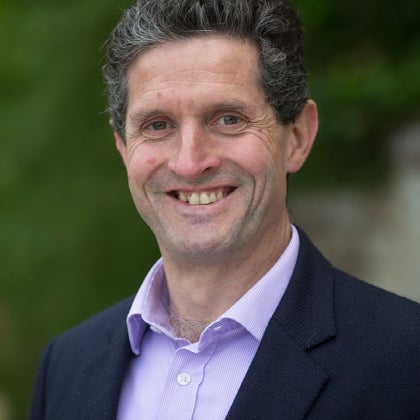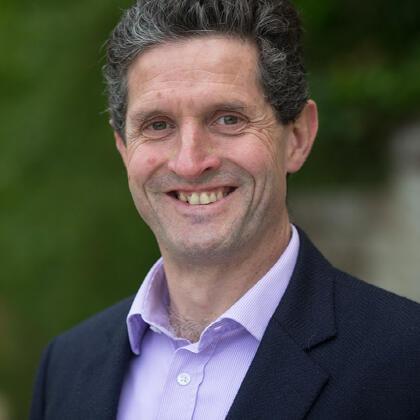Houston, We Have a Problem: How the Fossil Fuel Industry is Risking Our Future and Your Pension
Share
- Details
- Text
- Audio
- Downloads
- Extra Reading
When oil and gas industry leaders flew into Houston for CERAWeek 2024, oil was over $80 per barrel and demand higher than ever. There was little discussion of “transitioning away from fossil fuels” as agreed at COP28 in Dubai.
In the run-up to COP29, this lecture argues for a change in the narrative, so those with the ability and resources to solve the climate problem have less incentive to shuffle responsibility onto ordinary people who do not.
Download Text
Houston, we have a problem: Fossil fuels in a net zero world
Professor Myles Allen
26 November 2024
$300 billion per year, the hard-won climate finance package agreed at COP29, is a lot of money. It is almost as large as the annual revenues of ExxonMobil, whose products account for less than 2% of global fossil carbon dioxide emissions. In fact, $300 billion is about what the world spent on fossil fuels over the two weeks that COP29 was happening in Azerbaijan.
As another COP in an oil and gas producing country draws to a close – and before anyone gets too pious, remember that Britain, proud host of COP26, still outranks Azerbaijan in hydrocarbon production – people are understandably reluctant to put climate finance in the context of fossil fuel expenditure. But we have to talk about the elephant in the corner.
What we spend on fossil fuels (most of which, to be fair on ExxonMobil, flows into the coffers of those same governments making pious resolutions on our behalf at COP29) dwarfs any conceivable figure for climate-related financial flows to developing countries. This matters, because they are making the decisions that will lock in fossil fuel use for decades.
I will be in London twice this week talking about the role of the fossil fuel industry in addressing the climate challenge: in Tuesday’s Gresham Lecture, and in a conversation on debunking Net Zero myths with Claire Coutinho, our Shadow Secretary of State for Energy Security and Net Zero, at UnHerd on Wednesday evening.
The first myth I’d like to debunk (and it’ll be interesting to see how this goes with Claire Coutinho’s supporters) is the idea that the amount we spend on fossil fuels shows that they are so important to our way of life that it makes more sense to adapt to global warming than to go through the trauma of trying to stabilize temperatures even by 2100.
Bjorn Lomborg, for example, likes to suggest that 3-4°C of warming would only cost a few percent of global GDP. But what he forgets to mention is that every study he quotes in support of this claim has to make assumptions about the relative value of climate impacts on rich and poor. Many densely populated low-lying coasts or tropical regions will be rendered uninhabitable by 3-4°C of global warming. It seems implausible that the inhabitants of those regions will stoically accept their fate because they weren’t contributing that much to global GDP in the first place: no, they will show up in Kent in small boats.
The second myth is that, because we’re going to pass 1.5°C, we are doomed anyway, so we may as well just buckle down and adapt. This is absurd: everyone, including (and perhaps especially) the fossil fuel industry, knows we could stop global warming within a generation, which would limit the entirety of future warming to less than has happened since the 1990s. That would not be enough to limit peak warming to less than 1.5°C, but it would keep it well below 2°C and is certainly far better than the alternative of steaming on to 3°C and beyond. But it won’t happen with today’s approach to climate policy.
Which brings us to the third myth, which is hardest to debunk because absolutely everyone seems to have an interest in perpetuating it: this is that we can only solve climate change by phasing out fossil fuels. Environmentalists are convinced that we will only make progress when the fossil fuel industry is dead and buried. But while the industry has provided plenty of evidence to support this, we all just have to hope they are wrong. Even in the most climate-optimistic scenarios, we are still using oil and gas past 2100.
Oddly, many spokespeople for the fossil fuel industry seem quite comfortable with the phase-out narrative as well, saying they are just servicing demand for as long as “society” wants their product – and that the decision to “transition away” means there is no longer a business case for them investing their own money in technologies like carbon capture that are essential to stop the fuels they sell from causing global warming. And finally, both investors and climate policy wonks love pointing out that capital investment in the energy transition far exceeds investment in new fossil fuel supplies, which peaked in 2015. Their message, I think, is that the fossil fuel industry is finally starting to wither away.
Another message might be that it doesn’t take as much capital to expand a coal mine than to build the equivalent number of windfarms – and it opens the door for Donald Trump to tell his supporters that the reason fossil fuel prices are so high is underinvestment in supply ever since that pesky Paris Agreement in 2015.
So, while there is much to applaud in the Labour government’s just-get-on-with-it approach to Net Zero – in stark contrast to the dithering advocated by some other parties – the commitment to ban new extraction of oil and gas from the North Sea is a missed opportunity. There is no point in setting an example to the world that the world is unable to follow. And for the world’s oldest polluter to brag about keeping it in the ground, just as our oil and gas was about to run out anyway, comes across as a bit rich to countries like Guyana that have only just discovered their North-Sea-like riches.
What we could do instead, and what everyone at UnHerd who is concerned about climate policy becoming a tool for introducing a planned economy should get behind, is to make new extraction and import of fossil fuels conditional on safe and permanent disposal of the carbon dioxide they generate. This, we pointed out in a paper in Nature last week, is what it takes to achieve Geological Net Zero: one tonne of carbon dioxide captured and reinjected back underground for every tonne still generated by any continued use of fossil fuels. The industry could easily get there by 2050 – look at how fast they deployed fracking when their backs were against the wall – but only if they are required to get on with it.
A single regulation on a highly profitable and tightly regulated industry is hardly a transition to Stalinism, although you can be sure ExxonMobil lobbyists will cast it as such. And even with such a “backstop” policy in place, there will still be a need for policies to manage demand. If we leave it to the market we risk discovering, as Germany did in 2022, we are completely dependent on a single cheap supplier who turns out to be a ruthless maniac. We need to diversify energy supplies in general, and fossil fuel supplies in particular, purely for the sake of national security. But with a policy in place to ensure that any remaining gas and petrol sold in the UK past 2050 will be fully compliant with net zero, climate policy would no longer depend on requiring every single consumer to switch to an electric car or home heat-pump. Which, at the very least, would require headline-writers at the Daily Telegraph to come up with something else to complain about.
© Professor Myles Allen, 2024
Part of:
This event was on Tue, 26 Nov 2024
Support Gresham
Gresham College has offered an outstanding education to the public free of charge for over 400 years. Today, Gresham College plays an important role in fostering a love of learning and a greater understanding of ourselves and the world around us. Your donation will help to widen our reach and to broaden our audience, allowing more people to benefit from a high-quality education from some of the brightest minds.


 Login
Login







